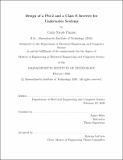Design of a Phi-2 and a Class E inverter for underwater systems
Author(s)
Pinzón, Carla Nicole.
Download1237530580-MIT.pdf (6.270Mb)
Other Contributors
Massachusetts Institute of Technology. Department of Electrical Engineering and Computer Science.
Advisor
James Bales.
Terms of use
Metadata
Show full item recordAbstract
In Autonomous Underwater Vehicles (AUVs), many potential failure modes exist due to pressure housing and the need for connections between different pressure housings. Waterproof connectors do exist but drive up the price and weight of underwater systems, a costly disadvantage as mass and volume are at a premium for an underwater system. If we can remove the necessity for physical connectors, we can design cheaper, more robust submarines. This can be done with wireless power transfer (WPT), which can transmit power efficiently across mediums within the submarine, therefore eliminating the need for physical connections and making underwater systems more compact and light-weight. The thesis presents two WPT systems for an AUV with two different inverters that convert DC power to AC power that drive the WPT system. The first system presented uses a Class E Inverter, a common topology for DC-AC conversion, and the second system utilizes a Phi-2 Inverter, a topology that uses the inherent parasitic capacitances to substitute for physical components. The WPT system utilizes magnetic resonance coupling to transmit power from transmitter coils attached to the inverters to receiver coils attached to a load through a rectifier. Simulations show that, when correctly tuned, the two designs can give comparable performance in power transfer efficiency and range. The choice of design is likely to be decided by a combination of the size and weight of the finished system, along with the ease of design.
Description
Thesis: M. Eng., Massachusetts Institute of Technology, Department of Electrical Engineering and Computer Science, February, 2020 Cataloged from student-submitted PDF of thesis. Includes bibliographical references (pages 91-95).
Date issued
2020Department
Massachusetts Institute of Technology. Department of Electrical Engineering and Computer SciencePublisher
Massachusetts Institute of Technology
Keywords
Electrical Engineering and Computer Science.